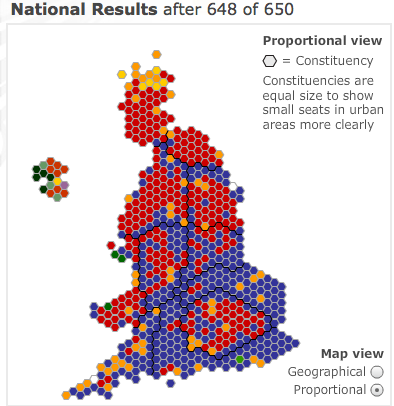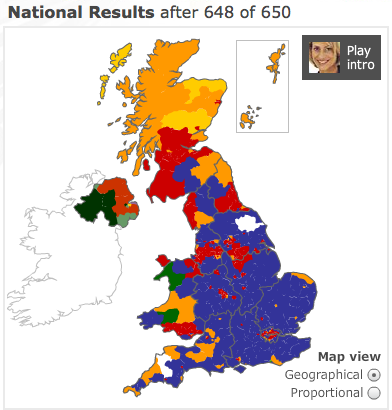Scotland in Britain will never get the government it votes for
Posted by Jack in Uncategorized, tags: democracy, elections, independence, Labour, republicanism, SSP, ToriesHere, you can see two maps of the election. To the left is a map of all the seats and who has taken them. Above, those same constituencies are all shrunk to the same size, so that you can see where how much of a proportion of the total UK vote the population of Scotland represents – not very much.
With the prospect of the Tories retaking power (with the support of the fake radical and con man Clegg), Scotland is experiencing a nasty 80s flashback.
Last night’s election results powerfully reinforce the case for Scottish independence.
In the 80s, Scotland consistently voted overwhelmingly for Labour, but it made no difference. The vast majority of the UK’s population are concentrated in the South East, London and its surroundings. This is where British governments are elected. After 18 years out of power, Labour were elected in 1997 because they transformed themselves into a right wing, neoliberal party in order to win the votes of these seats.
Under the last Tory regime, the most notorious example of how they ruled Scotland with contempt came when they imposed the Poll Tax in Scotland a year early. That helped kick off a mass campaign of resistance that ultimately led to the formation of the SSP.

Poster for the SSP's protest in 2004, demanding a Scottish Republic
There’s nothing inherent about being Scottish that means we’re more left wing than people in the South East. Until the 50s, the Tories usually got the biggest share of the vote here. But for the last 50 years or so, the political consensus in Scotland has been that people basically want left wing, old Labourish policies. Since the 80s, although we’ve voted for that, we haven’t got it. Since Tony Blair became leader of the Labour Party we couldn’t even try to vote for a government that would implement what most people want.
In the 80s, hating the Tories became virtually synonymous with being Scottish. There was an important reason for that – Scots pretty much didn’t live in a democracy, they didn’t get the government they vote for.
Last night, Scotland overwhelmingly voted Labour again. Things are slightly different now. Although the Labour Party in the 80s was a long, long way from being perfect, people aren’t voting for something that even approaches what they want any more, they’re voting against what they don’t want – the Tories.
Perhaps the most important consequence of the undemocratic governments of the 80s in Scotland was that it became impossible for the British ruling class to not concede a Scottish Parliament. Holyrood was a concession to try and buy off Scotland, staving off the anger of Scottish people that they don’t get the government policies they want.
But the fact remains that the vast majority of people can’t vote out to get rid of Trident nuclear weapons from Scottish soil, we can’t vote against neoliberal economic policies, and we can’t vote for a full welfare state and an end to the scapegoating of people on benefits. These things are all still controlled by the London government.
In the aftermath of the election, who will form the next government isn’t clear. In this situation, the need for a republic couldn’t be clearer. The UK government operates in the name of the Queen. The UK is still a monarchy, governed by crown powers. That means that the actions of the UK government, and who ultimately will form that government, isn’t decided by the people, but is controlled by the unelected elite, in the name of the Queen. That’s why the SSP has stood consistently not only for independence, but also for a republic. The SNP say they want independence, but they won’t make a clear commitment to getting rid of the monarchy and establishing a Scottish republic – which would mean Scotland ultimately was still controlled by the traditional British elite.
Scotland became part of the British state 303 years ago. But the Scottish state never ceased fully to exist. Throughout that whole time, there was still a separate Scottish legal system, official church and education system. Since the establishment of the Scottish Parliament, the scope of what the submerged Scottish state controls has got much greater. But in the face of a possible return to the power of the anti-Scottish Tories, its time that everything done by the state in Scotland/the Scottish state is brought under full democratic control. The only way to do that is to establish a completely independent, democratic republic.

Protesting for a Scottish Republic, on Calton Hill in 2004
This would mean that the national question would no longer dominate Scottish politics. Nobody would blame England for our social and class problems. People would be able to completely focus on the role of Scottish bosses (and their international partners in England and around the world) and Scottish governments in oppressing the Scottish working class. The SNP would probably split as well, with the many socialists who are members of it but want to see independence first focusing completely on the social struggle.
We’re socialists, and anti-capitalists. We want to see Scotland go further than the reformist politics of old Labour. We want Scotland to move towards the full abolition of capitalism, transforming relations in Scotland so that nobody is exploited, working to make a minority get rich while we get poorer. But there’s a basic issue of democracy here. The vast majority of people in Scotland don’t want the right wing, neoliberal policies of the British governments of the last 30 odd years. If the Scottish state is to become a democracy, then we need an independent, democratic republic.
Bonuses: Check out this article about the need for a republic. And check out this wiki article for full details about the Declaration of Calton Hill and the SSP’s protests for a Scottish republic.


 Entries (RSS)
Entries (RSS)
Great piece there from SSY. Let us build a movement united around the core demands of Scottish independence and the establishment of a Scottish Republic.